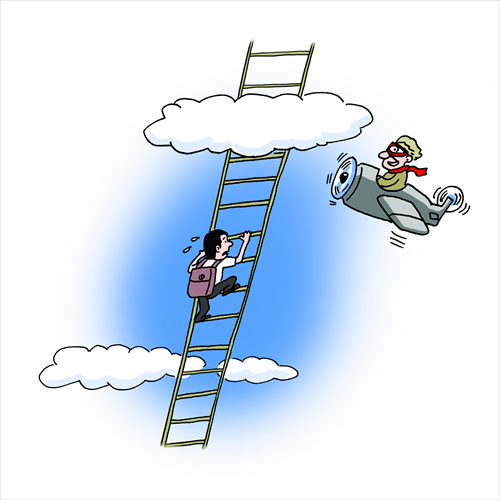HOME >> OP-ED
Admissions fears eroding Asian identity
By Rong Xiaoqing Source:Global Times Published: 2015-6-18 20:03:02

Illustration: Liu Rui/GT
Last month, more than 60 Asian organizations filed a complaint with the Office for Civil Rights of the US Education Department against Harvard University, accusing the school of discriminating against Asian American students in its admissions policy. The complaint cited independent research that finds, adjusted for other qualification factors, Asian American students on average need to score 140 points higher than white students, 270 points higher than Hispanics, and 450 points higher than black applicants to be admitted by Harvard.This is not the first time Asian Americans have lashed out against the top university in the US. Asian Americans have been relentlessly arguing that as high achievers in the academic world and a major racial group in colleges, they are shortchanged by affirmative action in the higher education system aimed at creating a diverse student body.
More than 20 years ago, the Education Department's Office for Civil Rights conducted an investigation into Harvard's admissions policy toward Asian American students after complaints that they were admitted at lower rates than white students. But the investigation closed in 1990 with the conclusion that Harvard was not racially biased against Asian applicants.
In 2011, a rejected Asian American applicant filed a complaint with the Education Department against Harvard and Princeton University with similar accusations. The cases were withdrawn the next year.
Last year, advocacy organization Students for Fair Admissions, representing some anonymous students, filed a federal lawsuit against Harvard again for the same reason. The case is still pending.
The allegations are similar and yet so far there hasn't been any change in the admissions policy at Harvard. What has changed are Asian American students themselves. They seem to have learned quickly how to get themselves into the Ivy League schools strategically. College coaches that work with Asian American students often tell them to downplay their Asian background.
Biracial students are encouraged to identify themselves with their non-Asian background in the application form. Students who are 100 percent Asian are told to avoid talking about extra-curricular activities that are popular among Asians such as playing piano or badminton. Children of Asian immigrants are discouraged from talking about their family's immigration experience in their personal essays. And they are even told to change their legal names if they can to make it sound less Asian.
These tactics have caused controversy even in the Asian community. Compared to white kids and even black kids, it often takes longer for Asian kids to find their identity and to be proud of it. For some Asian kids, the efforts of trying to be less Asian to fit in the "mainstream" may have included dark memories from their childhoods. Now forcing themselves to go through it again to get admitted by a top university could be psychologically damaging.
But hiding one's identity for practical reasons is not a new tactic for people struggling. Back in the era when the notorious Chinese Exclusion Act largely prohibited Chinese from immigrating to the US, many Chinese had to adopt the last name of an American citizen in order to bypass the restrictions and to get in this country as children of US citizens.
Even for those who were not directly affected by the Chinese Exclusion Act, similar tricks may be adopted for self-protection reasons. That's why there are many Chinese families in Chinatown who spell their last names in Western styles such as Lee, Louie and Young.
After the Pearl Harbor attack pushed the US into WWII, many Japanese living in the US moved to Chinatown and pretended to be Chinese to avoid being put in concentration camps. And even now black and Hispanic job seekers in this country still sometimes change their names and hide any experience that could reveal their racial background in their resumes in order to get a call back from potential employers.
No one likes to hide their identities and pretend they are someone else. So when things like this happen, it almost always becomes an unmistakable sign that there is something wrong with the system.
In this particular case, Harvard is not wrong for trying to make its campus more diverse. After all, Asian Americans made up 21 percent of the incoming freshman class there, four times their percentage in the wider American population. And a key to American society's progress is to create opportunities for those who may be left behind - in this case black and Hispanic students mainly.
However, such progress will not be achieved by punishing those who walk faster than others, because they can set the pace for everyone else.
The author is a New York-based journalist. rong_xiaoqing@hotmail.com
Posted in: Columnists